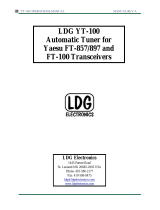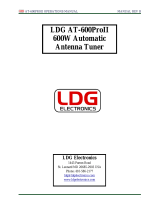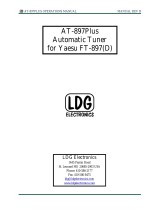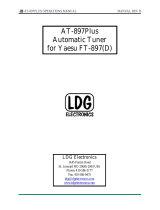Page is loading ...

YT-1200 Operations Manual Version 1.1
2
Quickstart Guide 3
Introduction 4
Specifications 5
Getting to know your YT-1200 5
Front Panel 6
Rear Panel 7
Installation 8
Overview 8
Radio Configurations 10
Operation 11
Power-Up 11
Basic Tuning Operation 11
Toggle Bypass Mode: 12
Memory Tuning Cycle 13
Full Tuning Cycle 14
Status LED 15
Tune Button Press Summary 15
Application Notes 16
Mobile Operation 16
Tuning On The US 60 Meter Band 16
MARS/CAP Coverage 16
Operation with a PC / CAT 17
Using Both Antenna Ports 17
A Word About Tuning Etiquette 19
Care and Maintenance 19
Technical Support 19
Two-Year Transferrable Warranty 19
Out of Warranty Service 20
Returning Your Product For Service 20
Product Feedback 20
Table of Contents

YT-1200 Operations Manual Version 1.1
3
Quickstart Guide
1. Turn off the radio, and the radio’s power supply.
2. Connect the antenna jack on the transceiver to the Tx jack on the YT-1200, using
a 50 ohm coax cable.
3. Connect a 50 ohm coax antenna feedline to the Ant jack on the YT-1200.
4. Connect the 8-pin mini-DIN plug on the supplied radio interface cable to the
TUNER port on the back of your transceiver. The YT-1200 draws 12V power
from the radio via this jack
5. Connect the DB-9 plug on that same end of the radio interface cable to the CAT
port on the back of your radio.
6. Connect the DC coax plug on the other end of the radio interface cable to the
Power jack on the rear of the YT-1200.
7. Connect the remaining DB-9 plug to the DB-9 jack marked Radio on the rear of
the YT-1200.
8. Turn on the radio’s power supply and then turn on the radio.
9. The tuner will automatically detect the radio’s communications settings and may
take up to 10 seconds. See the section on Radio Configurations.
10. Select the desired operating frequency.
11. Push and hold the Tune button on the front of the YT-1200 for one second (until
the Tuning LED comes on), then release. The transceiver automatically switches
modes, keys up with a minimal amount of power, and the YT-1200 begins a
tuning cycle. At the end of the tuning cycle, the original mode and power level is
restored.
12. Wait for the tuning cycle to end; you are now ready to operate!
Important Safety Warning
Never install antennas or transmission lines over or near power lines. You can be
seriously injured or killed if any part of the antenna, support or transmission line
touches a power line. Always follow this antenna safety rule: the distance to the
nearest power line should be at least twice the length of the longest antenna,
transmission line or support dimension.
You should really
read the whole
manual, but this
summary will get
you started.
Keep antennas,
supports and
transmission lines
well away from
overhead power
lines.

YT-1200 Operations Manual Version 1.1
4
Introduction
LDG pioneered the automatic, wide-range switched-L tuner in 1995. From its
laboratories in St. Leonard, Maryland LDG continues to define the state of the art in
this field with innovative automatic tuners and related products for every amateur
need.
Congratulations on selecting the YT-1200 automatic tuner for Yaesu HF transceivers.
The YT-1200 integrates seamlessly with your Yaesu transceiver, providing semi-
automatic antenna tuning across the entire HF spectrum, at power levels up to 125
watts. It exchanges data with your transceiver, allowing you to control all tuning
operations with the tuner’s Tune button. The YT-1200 will tune dipoles, verticals,
Yagis, or virtually any coax-fed antenna. It will match an amazing range of antennas
and impedances, far greater than some other tuners you may have considered,
including the built-in tuners on many radios. The YT-1200 is similar to previous LDG
tuners, but is specially engineered to integrate with these Yaesu HF radios:
• FT-450 and 450D
• FT-950
• FT-991 and 991A
• FTdx1200
• FTdx3000
The YT-1200 connects to the Cat port on the back of the radio. There is a pass-
through data port to connect to your PC for computer control of the transceiver.
Tuning is greatly simplified; use the Tune button on the tuner to start an automatic
tuning cycle.
The YT-1200 is
custom made for
Yaesu transceivers,
and exchanges data
and control signals
with the radio.

YT-1200 Operations Manual Version 1.1
5
Specifications
• 1 to 125 watts SSB and CW peak power, 100 watts on 6 meters, and 30 watts on
PSK and digital modes.
• Latching relays for ultra-low power operation.
• 2,000 memories for near-instant frequency and band changing.
• Power: 12VDC, supplied by the transceiver. 500mA max. Power jack is 2.5x5.5mm
center positive.
• Designed specifically for the Yaesu FT-450, FT-450D, FT-950, FT-991, FT-991A,
FTdx1200, and FTdx3000 HF transceivers.
• Pass-thru CAT port allows the YT-1200 to control the transceiver over the CAT
bus while still allowing a host PC to also control the radio. Use any baud rate.
• 1.8 to 54.0 MHz coverage. Frequency for memory storage is read from the radio via
the CAT interface.
• Tunes 4 to 800 ohm loads (16 to 150 on 6M), 16 to 3200 ohms with optional 4:1
Balun.
• For Dipoles, Verticals, Vees, Beams or any Coax Fed Antenna.
• Optional external Balun allows tuning of random length, long wire or ladder line
fed antennas.
• Radio interface cable included. LDG IC-450.
• Dimensions: 7.25”L x 7.75”W x 2.25”H.
• Weight: 1 pound 8 ounces
Getting to know your YT-1200
Your YT-1200 is a quality, precision instrument that will give you many years of
outstanding service; take a few minutes to get to know it.
The YT-1200 is designed for integrated use with Yaesu HF radios. Tuning is
performed by pressing the Tune button on the front of the tuner. The tuner
automatically communicates with your Yaesu transceiver, sets the proper mode and
power level for tuning, and keys the transceiver. The tuner can be placed in bypass
mode by pressing the Tune button on the tuner momentarily. Latching relays hold the
tuned configuration indefinitely, even when DC power is completely removed.
Tuning memories are stored indefinitely in flash memory. The transceiver provides
DC power to the tuner; no separate power supply is needed.
The YT-1200 has 2,000 frequency memories. When tuning on or near a previously
tuned frequency, the YT-1200 uses “Memory Tune” to recall the previous tuning
parameters in a fraction of a second. If no memorized settings are available the tuner
runs a full tuning cycle, storing the parameters for memory recall on subsequent
tuning cycles on that frequency. In this manner, the YT-1200 “learns” as you use it,
adapting to your bands, frequencies and antenna characteristics as it goes.
Always operate
within these limits.
You’ll be using
your YT-1200 for a
long time; take a
few minutes to get
to know it.

YT-1200 Operations Manual Version 1.1
6
Front Panel
On the front panel there is one pushbutton and one LED indicator light.
• Tune button: Initiates either a memory tune or a full tune, and also toggles the
tuner between “active” and “bypass” modes.
• Status LED: Lights to give feedback on button presses, lights during tuning, and
gives tune status at the end of a tuning cycle.
The Tune button
and Status LED
have many
functions.

YT-1200 Operations Manual Version 1.1
7
Rear Panel
The rear panel of the YT-1200 features six connectors:
• Ant connector: Connect the 50-ohm coax antenna feedline to this standard SO-239
connector.
• GND connector (wing nut): Connect to antenna system ground.
• Tx connector: Connect a 50-ohm coax jumper cable from this standard SO-239
connector to the ANT jack on the back of the transceiver.
• PC connector: This 9-pin DB-9 jack connects to a personal computer via a 9 pin
female-to-female straight-thru cable. Use of this port is optional; it is provided to
allow control of the radio by computer. This is a pass-thru port to the RADIO port,
and is switched under software control by the YT-1200’s microprocessor. The
firmware of the YT-1200 makes it seem transparent to the computer user; if you use
a computer to control your transceiver, plug the cable from the PC into this port
instead of the CAT jack on the back of the transceiver.
• Radio connector: This 9-pin DB-9 jack connects to the radio’s CAT jack. During
tuning the YT-1200 controls the PTT, power level, and operating mode via CAT
commands sent to the transceiver. The YT-1200 also reads the operating frequency
directly from the transceiver for storing and retrieving tuning memory data.
• Power connector (DC coax jack): Connect to 12VDC supply capable of supplying
at least 500 mA. Center pin is positive, 2.5 x 5.5 mm. The tuner is powered by the
radio when used with the provided IC-450 interface cable.
The rear panel has
standard SO-239
sockets for RF
input and output,
two data sockets for
radio connection, a
power socket, and a
ground post.

YT-1200 Operations Manual Version 1.1
8
Installation
Overview
The YT-1200 tuner is designed for indoor use only; it is not water resistant. If you use
it outdoors (Field Day, for example) you must protect it from rain. The YT-1200 is
designed for use with coax-fed antennas. You may need a balun to use your YT-1200
with longwires or antennas fed with ladder line. Either the LDG RBA-4:1 or RBA-1:1
is ideal, depending on the antenna and transmission line used.
Always turn your radio off before plugging or unplugging anything. The radio may be
damaged if cables are connected or disconnected while the power is on.
Your YT-1200 tuner is compatible with the following Yaesu HF transceivers:
• FT-450 and 450D
• FT-950
• FT-991 and 991A
• FT DX 1200
• FT DX 3000
WARNING: Do not attempt to use the YT-1200’s radio interface cable with any
other transceivers, even if the plugs fit. At best the YT-1200 simply won’t work with
other radios. At worst it could damage the tuner, the radio or both.
The YT-1200 is supplied with the IC-450 radio interface cable. Each end has two
connectors. On the radio side, the round 8-pin mini-DIN connector goes to the radio’s
TUNER jack, and the DB-9 connector goes to the radio’s CAT jack. On the tuner
side, the round coaxial power connector goes to the tuner’s Power jack, providing 12
volts dc to the tuner, and the DB-9 plug goes to the tuners’ Radio jack. Connect the
ANT jack on the radio to the Tx jack on the back of the YT-1200.
You may optionally connect an RS-232 cable between the PC jack on the tuner and
your PC for computer control of the radio; this cable is not included.
Your YT-1200 is
not water resistant;
keep it dry.
The YT-1200 radio
interface cable will
not work with any
other radios.
Turn your radio off
before you install
the tuner.
The radio powers
the tuner (except
for the FT-2000,
which requires an
external power
supply).

YT-1200 Operations Manual Version 1.1
9
Grounding the YT-1200 tuner may enhance its performance and safety. LDG
recommends that you connect your tuner to a suitable ground; a common ground rod
connected to buried radials is preferred, but a single ground rod or a cold water pipe
can provide a serviceable ground. LDG strongly recommends the use of a properly
installed, high quality lightning arrestor on all antenna cables.
The following illustration shows installation for typical Yaesu radios.
Connect your YT-
1200 to your
antenna and
transceiver using the
shortest practical
coax runs.

YT-1200 Operations Manual Version 1.1
10
Radio Configurations
Radio configuration varies slightly from model to model. These recommended
settings are referenced from a full reset of the radio with all settings at default. See
your radio’s operating manual for reset information. You can use any standard Yaesu
baud rate (4800, 9600, 19,200, 38,400), any TOT setting (10, 100, 1000, 3000) and
any RTS setting. Note: setting the TOT to 3000 may cause longer power up
configuration time for the tuner/radio combination.
FT-450 and 450D
There are no menu settings.
FT-950
There are no menu settings.
FT-991 and 991A
Quick info: Set Menu 28 – GPS/232C to RS-232C.
Details: Press Menu/Setup button momentarily to engage the menu display on the
bottom half of the display. Scroll using the MULTI knob and scroll to menu 028
labeled GPS/232C SELECT. Press the Select button on the touch screen. Turn the
MULTI knob clockwise until the selection is RS-232C, then press the Enter button on
the touchscreen.
Press the back button on the touch screen to exit menu mode. Turn the radio off and
back on to begin using the tuner.
FTdx1200
There are no menu settings.
FTdx3000
There are no menu settings.
Set your radio
according to these
instructions.

YT-1200 Operations Manual Version 1.1
11
Operation
Power-Up
The YT-1200 is powered by the transceiver. When the YT-1200 is first powered on
with your radio, the Status LED will come on as it checks the communication to the
radio. This may take a few seconds the first time, but will store the settings for that
radio. If the setting for the CAT port are changed, the tuner will automatically re-read
the settings and then store the new setting.
If the tuner fails to detect the radio, check for the following problems: an improperly
seated CAT cable, a damaged CAT cable, a blown CAT fuse, or plugging the CAT
cable into a radio other than those supported by the YT-1200. If none of these correct
the problem, try turning the radio and tuner off and back on again. If none of those
work, try a full reset of the radio.
Basic Tuning Operation
The YT-1200 is operated from the front panel Tune button on the YT-1200. Two
types of tuning cycles are available; a memory tuning cycle and a full tuning cycle.
The memory tuning cycle restores parameters stored after a previous successful tune
on the currently selected frequency. The tuner then checks to see that an acceptable
SWR match is found. If no memory match is found, the tuner will then perform a full
tune.
A full tuning cycle “starts from scratch” and begins a tuning sequence in which the
YT-1200 rapidly tries varying combinations of inductance and capacitance values,
and then zeroes-in on the best match possible. If an acceptable match is found, the
inductance and capacitance settings are saved in a memory associated with the
frequency so that they may be recalled quickly in the future via a memory tuning
cycle.
In this manner the YT-1200 “learns”; the longer you use it, the better it adapts itself
to the bands and frequencies used, and the characteristics of your antenna. Most users
will probably use memory tuning most of the time; it takes advantage of any saved
tuning settings, but automatically defaults to a full tuning cycle if no stored data is
available.
In both cases, at the end of the tuning cycle the carrier is held for about two seconds
after tuning is complete so that the final SWR may be read on the transceiver’s
internal SWR meter or another inline SWR meter, and the front panel LED will
indicate the status of the tuning cycle.
Your YT-1200 is
powered by your
radio.
You can start a
tuning cycle using
the front panel
TUNE button.
Your YT-1200
saves tuning
parameters so it
can tune instantly
when you return to
that frequency.

YT-1200 Operations Manual Version 1.1
12
Toggle Bypass Mode:
To toggle between active and bypassed mode, press the front panel Tune button on
the YT-1200 momentarily. The Status LED will flash three times to indicate that the
tuner is in bypass mode. Press the front panel Tune button momentarily again to
place the tuner in active mode and recall the previous tuner settings. The Status LED
will flash once to indicate that the tuner is no longer bypassed. This function may be
useful if you wish to compare antenna performance with and without the benefit of
the tuner’s matching network.
Press the Tune
button momentarily
to toggle between
active and bypass
modes.

YT-1200 Operations Manual Version 1.1
13
Memory Tuning Cycle
To initiate a memory tuning cycle, press and hold the Tune button on the front of the
YT-1200 until the Status LED lights, then release; a memory tuning cycle will begin.
The YT-1200 will set the mode, change the power level to one that is appropriate for
tuning, and key the radio. When tuning is complete, the transceiver will return to the
operating mode and power level previously set. You will notice that the radio toggles
between VFO A and VFO B before and after a tuning cycle. This is normal; the YT-
1200 is determining if the radio is operating in split mode, and acting accordingly.
The YT-1200 will tune under most split conditions, storing the tuning memory
information associated with the transmit frequency.
Memory tuning is
the default mode;
you’ll probably use
it most of the time.

YT-1200 Operations Manual Version 1.1
14
Full Tuning Cycle
You may need to run a full tuning cycle even when stored parameters are available.
For example, you or the elements may have changed some aspect of your antenna, or
reoriented it. In that case the stored parameters may not be optimal. Forcing a full
tune will cause the YT-1200 to seek a new match regardless of what is already stored
in memory for the current frequency.
To force a full tuning cycle, press and hold the Tune button on the front panel of the
YT-1200 until the Status LED lights up, and keep holding until the Status LED goes
out again. Release the Tune button once the Status LED goes out. A full tuning cycle
will begin. When tuning is complete, the transceiver will be restored to its previous
operating mode and power level. You will notice that the radio toggles between VFO
A and VFO B before and after a tuning cycle. This is normal.
You can force a
full tuning cycle if
needed by pressing
and holding the
Tune button.

YT-1200 Operations Manual Version 1.1
15
Status LED
The Status LED indicates various operating modes, tuning statuses, and error
conditions. The followings table lists the LED status codes and their meaning.
LED Indication
Meaning
Status LED on while tuning.
Tuner is tuning.
Status LED goes out after a tune,
then blinks 1 time.
Tuner has completed a tuning cycle;
a good SWR match was found.
Status LED goes out after a tune,
then blinks 2 times.
Tuning cycle is complete, tuning
match is between 1.5:1 and 3.0:1 SWR.
Status LED goes out after a tune,
then blinks 3 times.
Tuning cycle is complete, tuning
match is greater than 3.0:1 SWR.
Status LED blinks 4 times.
Tuning cycle failed, RF was lost in
the middle of the tune.
Status LED blinks 5 times.
Tuning cycle failed, no RF was
detected.
Status LED blinks 3 times and
repeats.
Communication with radio failed *.
Tune Button Press Summary
The tuner’s Tune button has three functions, depending on length of press:
• Bypass toggle: Short press (0 - 1 second)
• Memory tune: Medium press (1 - 3 seconds)
• Full tune: Long press (more than 3 seconds)
* If the tuner fails to communicate with the radio, check the interface cable
connections and cycle DC power on the radio and tuner.
The Status LED
has multiple
functions.
The Tune button has
three functions,
depending on how
long you hold it down.

YT-1200 Operations Manual Version 1.1
16
Application Notes
Mobile Operation
The YT-1200 is suited for mobile operation. It can be installed under the dashboard
along with the transceiver. The only requirement is that the tuner remain dry and is
properly grounded.
The supplied radio interface cable is 36 inches long. If you need to position the YT-
1200 farther from the transceiver than this cable length allows, you will need to
construct a custom cable. This can be accomplished in two ways: cut the supplied
cable and solder jumper wires between all the connections, or purchase new
connectors and cable to construct a custom-length interface cable from scratch.
The 9-pin CAT interface connector is Kobiconn part number 156-1309T-E, available
from http://www.mouser.com/ as Mouser part number 156-1309T-E. Pinout for this
cable is one-to-one, straight through; all nine signals are used. Be sure to use a DB-9
hood for the connector as well; this protects against shorts and other damage to the
connector.
Tuning On the US 60 Meter Band
The YT-1200 tunes in a carrier mode, but in the United States the FCC permits only
SSB transmissions in the 60 meter band. Therefore, Yaesu radios may not switch
modes but will remain in SSB mode. You can talk or whistle into the mic while in
SSB mode and then press the tune button on the tuner. If no audio is present during
SSB transmission then no RF will be generated, and the YT-1200 LED may blink a
“No RF Was Detected” error.
To tune on the 60 meter band you must key and speak into the microphone while
tuning. It will suffice to say “Ahh” for a few seconds while tuning. Be sure to identify
your station as required by regulations.
MARS/CAP Coverage
The YT-1200 provides continuous tuning coverage over its specified range, not just
in the ham bands. This makes it useful for MARS or CAP operation, or any other
legal HF operation.
Here are some
helpful notes on
using your YT-1200.
FCC regulations
require a different
tuning procedure
in the US 60 meter
band.

YT-1200 Operations Manual Version 1.1
17
Operation with a PC / CAT
Although the YT-1200 uses the transceiver’s CAT port for tuning control, it is
designed to also allow the user to continue to use the CAT interface with the
transceiver for PC control.
If PC control of the radio is desired, simply connect a 9 pin straight thru female-to-
female cable to the PC jack on the rear of the YT-1200, and connect to the PC’s serial
port. The rig control software on the computer and the radio can be set to any baud
rate.
The YT-1200 monitors the PC port for activity and waits until there is a pause in the
PC data before beginning any tuning cycle. When the tuning cycle is complete, it
returns control of the CAT interface to the PC.
This procedure is completely automatic and transparent to the user. Simply hook up a
PC, and use the rig control software as normal. Press the Tune button on the YT-
1200 when you want to tune. Some rig control software will detect that the radio is
no longer communicating with the PC during tuning. This is normal, and
communications with the PC will resume once the tuning cycle is complete.
Note: The YT-1200 must be powered-on to use its pass-through CAT port.
Using Two Antenna Ports
Some supported Yaesu transceivers have two antenna ports, selectable via a control
on the front panel. It is also possible to set up an “odd split” on the radio where
transmission is done on one antenna, and reception on the other. Simply choose
different antennas for VFO-A and VFO-B, and then enable split mode.
With a pair of YT-1200 tuners it is possible to use both antenna ports, and have one-
button pushbutton tuning for each antenna by “daisy-chaining” the PC ports on the
two YT-1200 tuners. Just be sure to have the correct antenna selected on the radio
when pushing the Tune button on the YT-1200 connected to that antenna port.
The advantage of this configuration is that two separate antennas can be used without
requiring retuning when switching between them. This is especially useful if a
TX/RX split is set up, where TX is on one antenna and RX is on the other. Just be
sure to tune both antennas prior to working the split, and the transceiver will
automatically switch between TX and RX antennas when you key the radio!
You can use both
antenna ports on
the radio if you wish
by “daisy chaining”
two YT-1200 tuners.
You can still use
PC/CAT control
with the YT-1200.

YT-1200 Operations Manual Version 1.1
18
Note that when daisy-chaining a second YT-1200 there is only one TUNER
port on the rear of the radio, so there is no place to plug in the second YT-
1200’s 8-pin mini-DIN connector to provide power to the tuner. The second
YT-1200 requires a separate power supply. An LDG power cable or wall plug
power supply are available from several dealers, including
www.cheapham.com. The DC plug is 2.5X 5.5mm with center positive.

YT-1200 Operations Manual Version 1.1
19
A Word About Tuning Etiquette
Be sure to use a vacant frequency when tuning. With today’s crowded ham bands this
is often difficult. However, causing interference to other hams should be avoided
whenever possible. The YT-1200’s very short tuning cycle minimizes the impact of
tuning transmissions.
Care and Maintenance
The YT-1200 tuner is essentially maintenance-free. You should always strictly
observe the power limits specified in this manual. The outer case may be cleaned as
needed with a soft cloth slightly dampened with household cleaning solution. As with
any modern electronic device, the YT-1200 can be damaged by temperature
extremes, water, impact, or static discharge. LDG strongly recommends using a good
quality, properly installed lightning arrestor in the antenna lead.
Technical Support
Technical support is always available by e-mail ([email protected]).
We’ve placed answers to common questions in the FAQ section of our web page.
LDG also keeps up to date product information on our web site, including product
manuals if you need a replacement. When you consider buying another LDG product,
our website has complete specifications and photographs you can use to help make
your purchase decision. There are also links to all of the quality LDG Dealers who are
ready to help you make your purchase decision.
Two-Year Transferrable Warranty
Your LDG product is warranted against manufacturer defects in parts and labor for
two full years from the date of purchase. This two-year warranty is transferable; when
you sell or give away your LDG product include the original sales receipt, and the
two-year warranty goes with the product to the new owner. There is no need to
complete a warranty card or to register an LDG product; your receipt establishes
eligibility for warranty service, so be sure to save it. Include a copy of your receipt
whenever you send your product to LDG for warranty repair. Products sent to LDG
without a receipt are considered requests for out-of-warranty repair. The warranty
does not cover damage or abuse; a failure caused by the customer or by an act of
nature (e.g. lightning), as determined by LDG, is not covered under the two-year
warranty. Damage can be caused by failure to observe the product’s published
limitations and specifications, or by not following good Amateur practice.
Be careful not to
interfere with
other stations
when you tune.
Email if you
have questions
or need help.
Your two-year
warranty is
transferable if
you sell or give
your tuner to
someone else.

YT-1200 Operations Manual Version 1.1
20
Out of Warranty Service
LDG will repair your product even after the warranty has expired; a reasonable fee
will apply. We will troubleshoot the problem, and based on your instructions either
contact you with an estimate, or fix it and bill you for any repair charges. Check our
web site for the latest information on obtaining out of warranty service.
Returning Your Product For Service
LDG does not require a return merchandise authorization, and there is no need to
contact LDG before returning your product. Download the LDG Product Repair Form
from our web site. On the Repair Form, describe the problems you’re experiencing.
Our technician will attempt to duplicate the problems that are describe, so please be
accurate and complete. LDG recommends using a shipper that provides a tracking
number. Include your email address so our return shipper can alert you when your
product is en-route back to you. Repairs can take six to eight weeks, but are often
faster. The most current information on returning products for service is found on the
LDG website under the Support menu item, then under the Tech Support sub-menu.
Send your carefully packaged unit with the Repair Form and a copy of your receipt
to:
LDG Electronics, Inc.
Attn: Repair Department
1445 Parran Rd
St. Leonard, MD 20685
Product Feedback
We encourage product feedback; tell us what you think of your LDG product. In a
card, letter, or email (preferred) tell us how you used the product, how well it worked
in your application, and any suggestions you have for enhancements or new products.
Send along a photo or even a schematic or drawing to illustrate your narrative. We
like to share your comments with our staff, our dealers, and even other customers on
the LDG website:
http://www.ldgelectronics.com/
We’ll be happy to
fix your tuner
even if it’s out of
warranty.
Pack it carefully,
include your
receipt for
warranty service,
and ship it to us;
no RMA is
required.
We love to hear
from our customers.
/


















